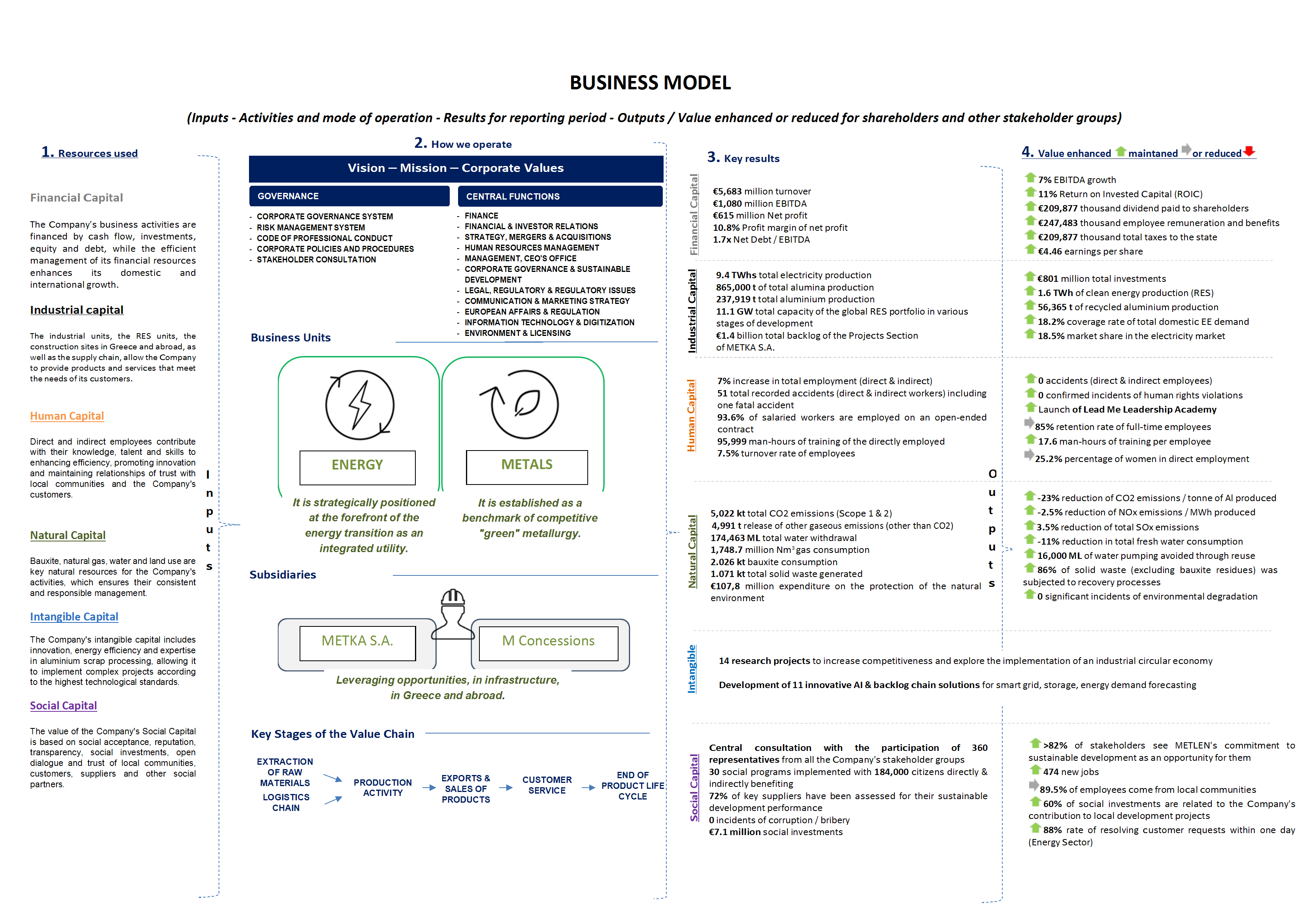Trade-offs (Natural Capital with the other categories of Capitals)
The utilization of industrial units requires investments in facilities and equipment that
are drawn from financial resources by making funds available.
At the same time, the value of Economic Capital is enhanced by revenues
from the sale of products as a result of industrial production. The utilization
of the resources of Industrial Capital affects the value of Natural Capital
mainly through the use of raw materials from non-renewable sources in the
production process, while in the long run a part of this lost value is reduced by the
Company's commitment to responsible consumption practices and production
with the aim of stabilizing and improving the environmental performance of its industrial
units. Investments related to Industrial Capital contribute to the
Company's compliance with the respective legislative and regulatory requirements, which has
a positive effect on the Social Capital category, enhancing its
social license operation, while positively affecting Human Capital by
further developing the skills of employees in order to meet the modern requirements of
the production process.
The use of raw materials from non-renewable sources, air pollutant emissions and waste
generation, in the context of Metlen' activity, limit
the value generated by the utilization of Natural Resources. Metlen, in order to
minimize its impact on the natural environment, along with
the certified environmental management system applied, promotes the implementation of best
available techniques in all its Business Sectors.
This practice requires financial resources, the allocation of which reduces Economic
Capital in the short term. At the same time, however, the value
of Social Capital is enhanced by ensuring compliance with the environmental
operating conditions and the social acceptance of the Company's activity.
Also, the conversion of raw materials and other materials into products, through the
utilization of Industrial Capital , increase the value reserves of
both Economic and Human Capital in the long run.
Research & Innovation
Research and Development (R&D) is a conscious business choice for Metlen, as well as a
modern necessity, within the framework of Agenda 2030 and the Sustainable Development
Goals (SDGs). The company invests in research and development with the aim of
contributing, to the extent possible, to the enhancement of scientific research, the
upgrading of technological capabilities of the country's industrial sector, and the
encouragement of innovation, ensuring industrial diversification and added value in its
products and services. Metlen' total investments in R&D for 2024 exceeded €2 million,
and concern both the Metallurgy and Energy Sectors.
Certification

The 86.7% of the industrial & RES plants of Metlen, have in place an Environmental
Management System, certified by ISO 14001:2015 Standard.

Social Capital
The implementation of Metlen social policy requires resources to be made to implement a range of social investments such as: sponsorships, donations, social programs and local infrastructure support actions that in the short term limit the value of its Financial capital while contributing decisively to its strengthening in the long run , since they contribute to maintaining the sustainability of the local communities in which the company operates and the wider community as a whole. In addition, Metlen 'relations with its Social Partners influence either directly or indirectly its image and reputation. These relationships, which are characterized by a variety of forms of partnership that are dictated by the social and economic conditions and are mainly implemented through the Company's Business Areas, are vital to enhance the value of all categories of funds that Metlen uses, contributing to the effective operation of its business model and the renewal of its social operating license over time.
Use of capital
Trade-offs (Social Capital with the other categories of Capitals)
For the implementation of Metlen' social policy, which is directly addressed to its local communities and the wider society, specific investments are implemented through sponsorships, donations, social programs and support of local infrastructure, which reduce the Company's Financial Capital in the short term, while in the long term contribute decisively to its strengthening. Metlen relations with its Stakeholders, affect either directly or indirectly its image and reputation. These relationships, which are characterized by a variety of forms of partnership, dictated by the respective social and economic conditions and implemented mainly through the Company's Business Sectors, are of vital importance for all Capital Categories utilized by Metlen, contributing to the effective operation of its business model and the renewal of its social license to operate over time.
Significant distinctions
Outputs
Percentage Distribution of Social Investments
* Support of Culture/Art/Sports (30.3%)
It’s Metlen’s strategic line to be an active member of its local communities and to make a positive difference where it operates. In this place you can see Metlen’s sustainability vision in action.
Annual Engagement process with Stakeholders:
The practice of Stakeholder Consultation is the implementation of METLENS' long-standing commitment to responsible entrepreneurship and open, social dialogue, to ensure its sustainability and create added value to society at large. In this direction, the 10th thematic consultation of the Social Partners on "Ensuring the alignment of METLEN's approach to Sustainable Development" was held at central level. The purpose of the consultation was to identify key issues of Sustainable Development, with the goal of assessing opportunities and risks that affect both the Social Partners and the operations and performance of METLEN.
SOCIAL
INVESTMENTS (m)
PERCENTAGE OF
EMPLOYEES FROM
LOCAL COMMUNITIES
CONTRIBUTION TO DOMESTIC EMPLOYMENT1
“THE TIPPING POINT” PROGRAM3
“PEDIATRIC TRAUMA CARE” PROGRAM5
TRAINING OF SUPPLIER6
INVESTMENTS IN
INFRASTRUCTURE OF
LOCAL COMMUNITIES (k)
TOTAL PAYMENTS TO GREEK SUPPLIERS (m)
BENEFICIARIES CITIZENS2
“DIATROFI” PROGRAM4
EVALUATION OF SUPPLIERS6
INTERNSHIPS